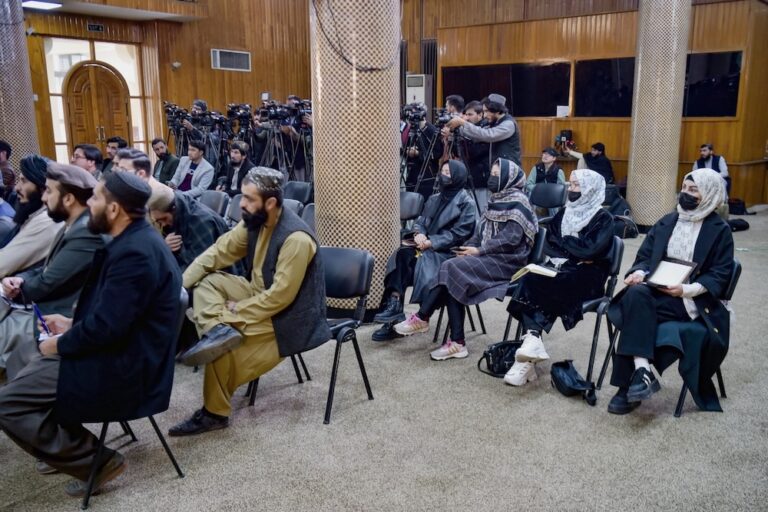(RSF/IFEX) – RSF has voiced concern over the closure of the privately-owned weekly “Aftab” and the 17 June 2003 arrest of its editor-in-chief and deputy editor for blasphemy. The newspaper published articles calling for a moderate interpretation of Islam and for its adaptation to the modern world in the wording of the new Afghan constitution. […]
(RSF/IFEX) – RSF has voiced concern over the closure of the privately-owned weekly “Aftab” and the 17 June 2003 arrest of its editor-in-chief and deputy editor for blasphemy. The newspaper published articles calling for a moderate interpretation of Islam and for its adaptation to the modern world in the wording of the new Afghan constitution.
“It is regrettable and worrying for the future of freedom of expression in Afghanistan to see a newspaper closed down and two journalists arrested for voicing their views on Islam’s place in the country’s future constitution,” RSF Secretary-General Robert Ménard said. He called on President Hamid Karzai to intervene to have them released and the newspaper reopened as soon as possible.
The Kabul Supreme Court’s Council of Ulemas (religious leaders) voiced outrage over articles that appeared in “Aftab”‘s 11 June issue. In a column entitled “Holy fascism”, editor-in-chief Sayeed Mirhassan Mahdawi criticised Islam as it is currently practiced and linked the social and economic backwardness of Islamic societies to its archaic character. He also criticised ethnic crimes committed in Islam’s name, especially by former mujahideen chiefs. Another article in the same issue said Islam, as practiced in Afghanistan, was contrary to democracy and to citizens’ social and political rights.
Calling the articles an “insult to Islam”, the Supreme Court asked that “Aftab” be closed and that its editor-in-chief be prosecuted. On 17 June, the government ordered the newspaper’s closure and Mahdawi’s arrest for “blasphemy”. Since then, Mahdawi and his deputy, Ali Payam Sestani, an Iranian national, have been detained in Kabul. They have reportedly not been mistreated to date.
A special commission for press freedom and news media evaluation has been given the job of determining the editors’ degree of responsibility before referring the case to the judicial authorities. Meanwhile, “Aftab”‘s offices have been closed. Copies of the latest issue were confiscated from several newsstands in the capital.
The Information and Culture Ministry has gone to great lengths to defend the Supreme Court’s position. “Several articles in the latest issue of ‘Aftab’ were blasphemous. . . It was our duty to stop this newspaper’s publication,” said Deputy Information and Culture Minister Hamid Mobarez.
With a circulation in Kabul of only several hundred, the Dari-language weekly is critical of the present government and the mujahideen chiefs. It has frequently accused warlords and mujahideen of crimes. Mahdawi, who lived for a long time in Iran and comes from the Shiite minority, publishes “Aftab” with the help of several Iranian journalists. In April, he received death threats by telephone after publishing an article calling for a secular government in Afghanistan.
The debate about Islam’s role in the new Afghan constitution has intensified in the past few weeks.


